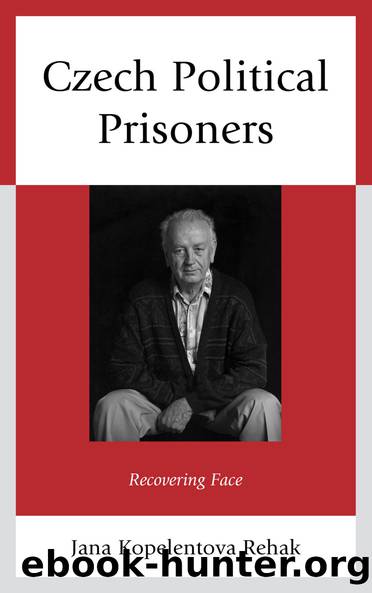Czech Political Prisoners by Rehak Jana Kopelentova;

Author:Rehak, Jana Kopelentova; [Rehak, Jana Kopelentova]
Language: eng
Format: epub
Publisher: Lexington Books
Published: 2012-08-15T00:00:00+00:00
This is a translation of a legal document, legitimized by a court and on the basis of which Radim was sentenced to a labor camp. Mukls often made it a point to quote or read to me, during our conversations, literal legal formulation as evidence of how the state criminalized them. Judicially formulated accusations, such as this one, were typically prepared before the trial. When I spoke to Radim, he indicated that Judr. ÄÞek, a defense lawyer, visited him in prison one time before the trial. He told Radim: âFor betrayal you will get something, but I will get you out of the spy accusation.â Radim replied: âBut Dr. ÄÞek, they are not accusing me of spying.â âEven better,â responded ÄÞek, and then he added: âIt will be better if you just admit all of it.â The judicial system and its pratitioners in Czechoslovakia played a significant role in transforming reality into fiction. ÄenÄk remembered his trial and death sentence as a continuous progression of events in the fall of 1949.
The investigating judge didnât come to me until a day before the trial. During the short meeting he said: âIt looks bad and whatever you get donât protest, anything will be better than a death penalty.â It was interesting for me, the judge was Chinese. He spoke Czech well, but with an accent. As I was waiting in one of the so-called death cells, I could hear when they were taking them for execution. Some were trying to kill themselves on the way. I could hear prisoners as they were hitting walls with their head. Some were silent, but in the end, before the execution all screamed for their mothers.
I was in fear of the idea that I could inflict pain on anybody outside. My consciousness confronted me about my choices and above all failing to protect my family. As I thought about my values, in contrast to hate and pain in surroundings, I was thinking a lot about the importance of the notion of love for life. I felt strongly that if I would maintain hate, I would shorten my life.
I was on trial in 1950. They called my mother and wife to come to the courtroom. I received the death penalty for political and army espionage against the socialist state. This was later changed to a life sentence with extra harsh conditions.
In his memory, ÄenÄk connected the fragments of his experiences into a continuous time line determined by fictive lies. When speaking, he tied arrest, interrogations, and trial together in such a way that I could see how the making of political fiction was embodied in all the events through which he had passed. He refused to refer to his experiences in terms of suffering, but rather in terms of living in a fictive condition in the space of death. I present Radim and ÄenÄkâs testimonies to show two different ways Mukls remember this fictive character of the state politics ratified by judicial actions. For Radim, the fictive
Download
This site does not store any files on its server. We only index and link to content provided by other sites. Please contact the content providers to delete copyright contents if any and email us, we'll remove relevant links or contents immediately.
The Vikings: Conquering England, France, and Ireland by Wernick Robert(83243)
Ali Pasha, Lion of Ioannina by Eugenia Russell & Eugenia Russell(40240)
The Conquerors (The Winning of America Series Book 3) by Eckert Allan W(37384)
The Vikings: Discoverers of a New World by Wernick Robert(36974)
Cecilia; Or, Memoirs of an Heiress — Volume 1 by Fanny Burney(32546)
Cecilia; Or, Memoirs of an Heiress — Volume 2 by Fanny Burney(31943)
Cecilia; Or, Memoirs of an Heiress — Volume 3 by Fanny Burney(31929)
Empire of the Sikhs by Patwant Singh(23072)
The Secret History by Donna Tartt(19052)
Hans Sturm: A Soldier's Odyssey on the Eastern Front by Gordon Williamson(18572)
Cat's cradle by Kurt Vonnegut(15334)
Pimp by Iceberg Slim(14488)
Sapiens: A Brief History of Humankind by Yuval Noah Harari(14368)
Talking to Strangers by Malcolm Gladwell(13347)
Norse Mythology by Gaiman Neil(13345)
Leonardo da Vinci by Walter Isaacson(13316)
4 3 2 1: A Novel by Paul Auster(12375)
Underground: A Human History of the Worlds Beneath Our Feet by Will Hunt(12089)
The Radium Girls by Kate Moore(12018)
